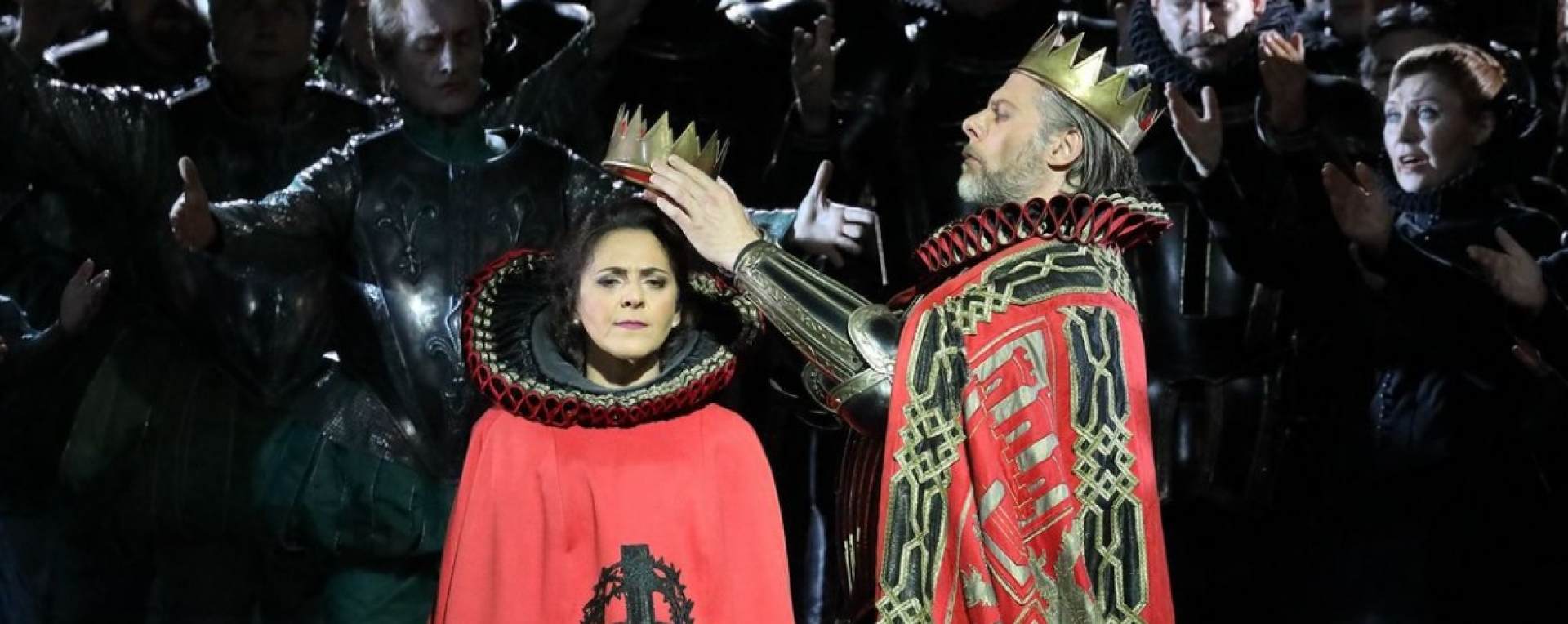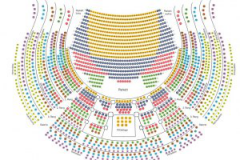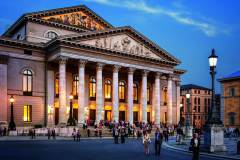Don Carlo
Mo | Tu | We | Th | Fr | Sa | Su |
Composer Giuseppe Verdi. Text by Camille du Locle after the Italian five act version of 1886 and 1867.
Opera in five acts (1867)
recommended for 16 years and older
In Italian. With German surtitles.
Spain in 1560: life on the brink of the abyss. A land ruled by church and state! Will the mighty – the grand inquisitor and the king – succeed in killing love? Will they manage to extinguish the blazing flame of liberty? Verdi's darkest opera causes us to tremble, but the composer’s musical genius does it in a fascinating and deeply moving way.
Act One
The Spanish Crown Prince, Don Carlos, has taken refuge in the monastery of San Juste in an effort to forget his misery at losing the woman he loves, Elisabeth of Valois, the daughter of Henry II of France. The two were betrothed and then fell in love with each other when they first met in Fontainebleau. But Don Carlos' father, King Philip II of Spain, decided to marry Elisabeth himself, for reasons of state. With this marriage, the war between France and Spain could be brought to an end, and Elisabeth acquiesced.
Act Two
Carlos awakes from his nightmare near the tomb of his grandfather, Emperor Charles V, in San Juste. He confides, in his despair, in his friend Rodrigo, the Marquis of Posa. Rodrigo comforts him and begs him to devote himself to the cause of the oppressed people of Flanders, which is under Spanish rule. Philip and Elisabeth come to pay their respects at the emperor’s tomb and the sight of Elisabeth is too much for Carlos, he is quite overcome and agrees to Rodrigo's proposals. Both swear that they will fight together for the cause of liberty.
Outside the monastery, Princess Eboli and the Queen's entourage are whiling away the time; Eboli has started singing a frivolous song which is interrupted by the arrival of the Queen. Rodrigo slips the Queen a message from Carlos requesting a private audience, which she grants. Carlos begs her to use her influence in persuading the King to send him to Flanders. He quickly loses his self-control, however, and reproaches her bitterly for seemingly having forgotten their love for each other. The Queen forces herself to remain calm. Carlos rushes from her presence.
When Philip finds the Queen unattended, which is strictly against the court protocol, he bans the lady-in-waiting responsible, Countess Aremberg, from the court. The King dismisses the Queen and her entourage but bids Rodrigo remain behind as he wants to talk to him. Rodrigo avails himself of this unexpected opportunity to describe to the King the suffering of the people of Flanders and pleads with the monarch to give them their freedom. Philip is impressed by his openness and now confides in him that he suspects that Elisabeth and his son are having an affair. Posa is to observe them.
Act Three
At midnight Carlos sees the veiled figure of Eboli, who is in love with Carlos, in the Queen's garden. Believing the figure to be that of Elisabeth, Carlos pours out his love for her. Eboli, disappointed at his dismay on realizing his mistake, accuses him of loving the Queen and threatens to expose their secret. Posa appears on the scene and tries to threaten her into silence. Upon this Eboli reveals that Rodrigo is in the King's confidence and swears to be revenged on him for humiliating her. When they are alone, Posa succeeds in persuading Carlos to give him any incriminating papers he may have about the unrest in Flanders.
The people of Valladolid are waiting impatiently for the beginning of the auto-da-fé, which is to take place in the presence of the King and the clergy. As the sign is given for the heretics to be burned Carlos, attended by six deputies from Flanders, interrupts the proceedings and begs his father for help for his suffering Flemish subjects. When the King refuses his request, Carlos draws his sword. With great presence of mind, Posa takes the sword off him. The ceremony continues and the fires are lit.
Act Four
Philip, accutely miserable, admits to himself that he has not been able to win Elisabeth's love. In spite of his power he is growing increasingly suspicious of all around him. He tries to discuss Carlos' grievous offence with the Grand Inquisitor and hopes for some advice as to how to deal with his son, who has been taken prisoner and should perhaps now be sentenced to death. The Grand Inquisitor reminds him of his duty as a monarch by the grace of God: if God was not afraid to give His only son that the world might be saved, then a king might surely also do so. For his part, the Grand Inquisitor denounces Posa as a free-thinker and demands his life. Philips resigns himself to handing over his new confidant to the will of the Church.
Elisabeth comes in bewailing the theft of her jewel casket, which she finds in the King's room. Philip has discovered a portrait of Carlos in it and now accuses the Queen of adultery. The Queen faints and Rodrigo and Eboli rush to her aid. Eboli confesses to the Queen that it was she who stole the casket and that she has been the King's mistress. Elisabeth bans the princess from the court. Eboli pours forth her grief and misery at what she has done – all that remains for her before she leaves the court is to do everything in her power to save Carlos.
Rodrigo visits Carlos in prison. By taking the incriminating letters into his own possession he has drawn suspicion onto himself and is now awaiting the reaction of the Inquisition. He is shot in the back by henchmen of the Inquisition. Dying, he urges Carlos to continue to fight for the liberty of the Flemish. When Philip comes to fetch his son from prison, Carlos rejects him and accuses him of murder. In the face of Carlos overwhelming sorrow at the death of his friend, Philip also comes to realize that he has lost the only man he could trust. The mob, urged on by Eboli, gains entrance to the prison and tries to force the King to release Don Carlos. The Grand Inquisitor appears, brings the revolt to an end with the sheer force of his personality and rescues the King from the anger of the mob.
Act Five
Elisabeth is waiting at the tomb of Emperor Charles V to pass on to Carlos Posa's last request. Don Carlos decides to flee secretly to Flanders, where he hopes to realize Rodrigo’s vision of a life in liberty. Philip surprises the two of them as they are taking leave of each other and now hands his son over to the Inquisition. Before Carlos can be seized by the guards of the Grand Inquisitor, the Emperor himself appears as a vision and takes his grandson into the safety of the cloister.
Translation: Susan Bollinger
Program and cast
Musical Direction: Zubin Mehta
Staging, Stage, Costumes, and Lighting Concept: Jürgen Rose
Assistant Director: Franziska Severin
Lighting: Michael Bauer
Choruses: Johannes Knecht
Philip II, King of Spain: Erwin Schrott
Don Carlos, Infante of Spain: Stephen Costello
Rodrigo, Marquis of Posa: George Petean
The Grand Inquisitor: Dmitry Belosselskiy
A Monk: Roman Chabaranok
Elisabeth of Valois: Rachel Willis-Sørensen
Princess Eboli: Ekaterina Semenchuk
Tebaldo, Page of Elisabeth: Elene Gvritishvili
The Count of Lerma: Samuel Stopford
A Royal Herald: Zachary Rioux
Voice from Heaven: Mirjam Mesak
Deputy 1: Andrew Hamilton
Deputy 2: Christian Rieger
Deputy 3: Nikita Volkov
Deputy 4: Daniel Noyola
Deputy 5: Yosif Slavov
Deputy 6: Mark Kurmanbayev
National Theatre Munich
The National Theatre Munich (German: Nationaltheater München) is an opera house in Max-Joseph-Platz in Munich, Germany. It is the home of the Bavarian State Opera and the Bayerisches Staatsballett(Bavarian State Ballet).
The Bavarian State Opera also performs in the Prinzregententheater, which opened in 1901 and, like the Bayreuth Festspielhaus, is built to Richard Wagner's specifications, and in the Cuvilliés Theatre at the Residenz, constructed in 1751–1753 and described by Thierry Beauvert as "a Rococo gem".
The Nationaltheater is very easy to get to both by car and by MVV public transportation.
By MVV public transportation
S-Bahn: S 1 - 8 Marienplatz
U-Bahn: U 3, 6 Marienplatz, U 3 - 6 Odeonsplatz
Bus: 52, 131 Marienplatz, 100 Odeonsplatz
Straßenbahn: 19 Nationaltheater
On the day of the performance, holders of regular tickets are entitled to use public transport provided by the Münchner Verkehrsverbund (MVV). This service starts at 3 pm respectively three hours before the performance commences and ends with the closing hour of the MVV.
By Car
Take the Altstadt-Ring to Maximilianstraße.
Parking garage Max-Joseph-Platz: open Monday to Sunday from 6:00 A.M. to 2:00 A.M.
You can take advantage of the special theatre parking fee of Euro 10,- from 6:00 P.M. to 8:00 A.M. by presenting your admission tickets.

 EN
EN DE
DE IT
IT FR
FR ES
ES RU
RU JP
JP RO
RO
 Seating plan
Seating plan 